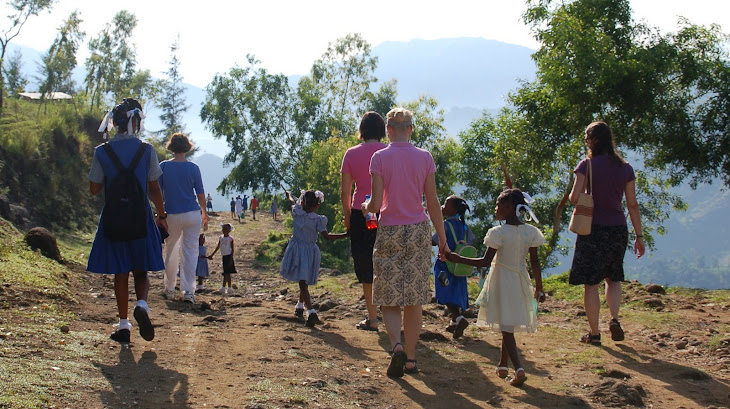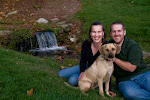This sermon was originally preached at Our Life Together, a continuing education gathering of Indiana clergy, on February 23, 2016. The theme for the event was "The Wilderness Experience."
The most
powerful book I read last year was Between
the World and Me by Ta-Nehisi Coates, who writes a letter to his teenage
son about race in America after the young man has an emotional breakdown in the
wake of the Michael Brown shooting. Today I’m borrowing his concept as I write
a letter to my two-month-old daughter about The United Methodist Church as we
approach seminal moments for our future. Let’s pray together.
Faithful God, help us to be such master of ourselves that no matter which wilderness we're wandering, we may be your servants to all other people. Take our minds and think through them; our lips, and speak through them; and then take our hearts and set them on fire. Amen.
My precious
daughter, you arrived in this world, bright-eyed and bushy-tailed, innocent and
open, at a time when it seems our community, our country, and our world are
wandering in the wilderness. How do we grapple with injustices in race and
class? How do we welcome the stranger? How do we love our enemies? How do we
open wide the table of God’s grace? This isn’t the first time God’s people have
been meandering.
Once upon a
time, God was enraged with a nation called Egypt where a mean old Pharaoh had
enslaved God’s special people. God raised up leaders named Moses, Aaron, and
Miriam, who led the former slaves out of Egypt and to the east (but not without
a fight and plagues and the Red Sea parting so they could pass through before it
washed out Pharaoh’s army). Before God’s special people could enter the
promised land, they had some learning to do, in what Daniel Erlander calls the
“Wilderness School.” Here they learned some important lessons – God gives manna
for all, hoarding stinks, and resting is essential. They received a covenant
gift of rules to guide their friendship with God, with each other, and with the
land around them.
God’s
people spent 40 long years learning these lessons, which is about the same
amount of time it takes to become a United Methodist pastor. Sometimes they
succeeded and brought glory to God. Other times they failed their exams by
complaining and hoarding and abusing other people and the land. In the book of
Numbers, chapters 13 & 14 tell an amazing story about God’s special people
before they left the wilderness. Watch carefully, little girl, and you’ll see
Brick Testament tell the story.
Before
God’s special people could graduate to the promised land where they would live
the way they’d been taught in the wilderness, God commanded Moses to send 12
spies to survey the territory, including Caleb and Joshua.
Moses said to them: What is it like? Are the people strong or weak, few or many? Is the
land in which they live good or bad? … Be courageous and bring back the land’s
fruit. It was the season for the first ripe grapes. (Numbers 13:17-20).
After 40
days of exploring, the spies returned to Moses and Aaron, hauling in huge
bunches of grapes, and gave their report.
Yes, the land was full of milk and honey and fruit. But you know what else they
saw, sweet child of mine? Huge, powerful people living in big, strong forts.
Giants controlled the promised land! Caleb, who was more courageous than the
rest, believed they could go up against these giants and take over the land.
But the others who were with him weren’t so sure: “We can’t go up against them
because they are stronger than we.”
They started a rumor about the promised land, telling
all of God’s people that these giants could devour them.
They felt like tiny little grasshoppers compared to these
big, fierce giants!
Little one,
can you imagine what all of God’s people did next?
They stayed awake the whole
night crying and complaining to God! If only we had died in the wilderness!
Why is God bringing us to the promises land only to be killed? Wouldn’t it be
better to go back to Egypt? Let’s pick a leader and head back!
Moses and Aaron
were so upset they fell on their faces. Caleb and Joshua tried to smooth things
over, to reassure them the promised land really was good and God really would
give it to them, but the entire community threatened to stone them.
Baby
girl, you’re only two months old, so you’re still sweet and smiley. But I promise you there will come a time in our life together, be it as soon as
your toddler years or certainly during your teenage years, where you do something
that makes your daddy and I so angry that you think, “Now I’ve finally gone and
done it.” That’s how angry God was at these disrespectful people! How long will they doubt me after all the
signs I performed among them? I’m going to strike them down and disown them.
Then I’ll make a great nation, stronger than they. But Moses begged God, “The Egyptians will hear, for with your
power you brought these people up from among them. They’ll tell the inhabitants
of this land. They’ve heard that you, Lord, are with this people. You, Lord,
appear to them face-to-face. Your cloud stands over them. You go before them in
a column of cloud by day and in a column of lightning by night. If you kill
these people, every last one of them, the nations who heard about you will say,
‘The Lord wasn’t able to bring these people to the land solemnly promised to them.
So the Lord slaughtered them in the desert.’ Now let my master’s power be as
great as you declared when you said, ‘The Lord is very patient and absolutely
loyal, forgiving wrongs and disloyalty. Yet God doesn’t forgo all punishment,
disciplining the grandchildren and great-grandchildren for their ancestors’
wrongs.’ Please forgive the wrongs of these people because of your absolute
loyalty, just as you’ve forgiven these people from their time in Egypt until
now.” (Numbers 14: 11-19).
Guess
what happened next? God actually listened to Moses, changed God’s mind, and
forgave the people! Now, there were consequences for their bad behavior. Only
Caleb and Joshua would see the promised land. Everyone else who refused to
listen to God wouldn’t make it there. They would die in the wilderness, and
their children would be stuck in the wilderness for 40 years. Our story doesn’t
have a perfect ending where you can tie everything up with a bow.
Real life
is like that, my child. It doesn’t always have a happy ending. But God is
merciful, faithful, and loving. No matter the wilderness we’re wandering, God
is with us. You’ve been born into a time when it seems the Church is wandering
the wilderness. We’re no longer center stage in our country or communities. Our
own denomination is shrinking on the vine in America while bearing fruit in other places. What
kind of Church will you inherit -- a grape or a raisin?
It all depends on what you believe
about the land God is promising us.
- If you believe the spies, then you’ll see violence and injustice looming large. You’ll believe the lies that some lives are worth more than others. But if you listen to Caleb and Joshua, then you know we can conquer giants like gun violence and poverty and human trafficking in your lifetime if we choose. As the Body of Christ, we can create a culture of peace and abundance and freedom where all lives matter, regardless of race or class or ethnicity or any other category.
- If you believe we are tiny grasshoppers, then you’ll latch onto the political rancor that says we need to build higher walls to protect ourselves. But if you believe in God’s promises, then you’ll remember we aren’t to hurt or oppress strangers, because we were once strangers in the land of Egypt. As God’s people, we are a global church. We welcome immigrants and refugees with open arms, especially our Muslim friends around whom we’ve created such a cloud of fear.
- If you believe in the giants, then you’ll also believe our church is stuck in a wilderness of division when it comes to human sexuality. The world is watching how we respond as a church and how we treat one another in our disagreement. If there are grapes in the promised land, then you know I’m striving for a more open church where all people are welcome at the altars of marriage and ordination, no matter who they are or whom they love. But even more importantly, I hope you see how God’s vision of the promised land forces me to love and respect the people who disagree with me. As you grow, you’ll discover how dark the wilderness is when you’re trying to love people who see a different promised land. No matter what happens at General Conference or in the years to come, may love still be the tie that binds us.
In a few minutes, we’ll break special
bread at a really holy meal. Before we do, we’ll have a chance to confess our
sins and brokenness. I hope we’ll remember all the lies we’ve believed about
the promised land and ask for God’s grace and forgiveness. Because when we
feast on the Body of Christ and share the cup of his blood, we’re empowered by
his grace to envision a new future for the Church. Will we be just?
Peace-filled? Welcoming? Open? Which will it be – giants or grapes? May the
sweet taste of the grape juice linger on our tongues and prepare us for the
land to come. Amen.

















